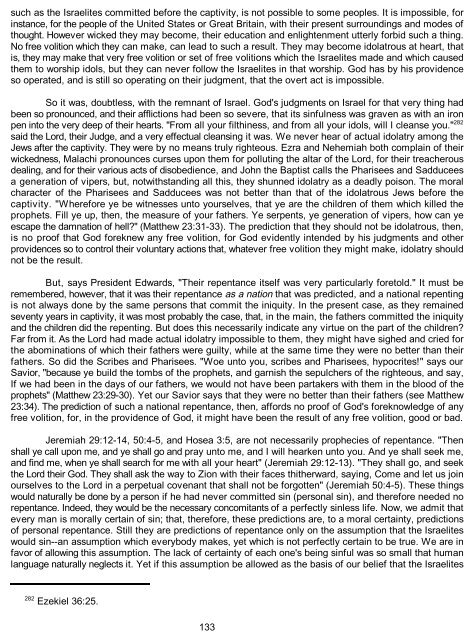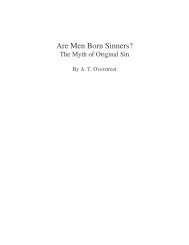Foreknowledge by Joel Hayes - Library of Theology
Foreknowledge by Joel Hayes - Library of Theology
Foreknowledge by Joel Hayes - Library of Theology
You also want an ePaper? Increase the reach of your titles
YUMPU automatically turns print PDFs into web optimized ePapers that Google loves.
such as the Israelites committed before the captivity, is not possible to some peoples. It is impossible, for<br />
instance, for the people <strong>of</strong> the United States or Great Britain, with their present surroundings and modes <strong>of</strong><br />
thought. However wicked they may become, their education and enlightenment utterly forbid such a thing.<br />
No free volition which they can make, can lead to such a result. They may become idolatrous at heart, that<br />
is, they may make that very free volition or set <strong>of</strong> free volitions which the Israelites made and which caused<br />
them to worship idols, but they can never follow the Israelites in that worship. God has <strong>by</strong> his providence<br />
so operated, and is still so operating on their judgment, that the overt act is impossible.<br />
So it was, doubtless, with the remnant <strong>of</strong> Israel. God's judgments on Israel for that very thing had<br />
been so pronounced, and their afflictions had been so severe, that its sinfulness was graven as with an iron<br />
pen into the very deep <strong>of</strong> their hearts. "From all your filthiness, and from all your idols, will I cleanse you." 282<br />
said the Lord, their Judge, and a very effectual cleansing it was. We never hear <strong>of</strong> actual idolatry among the<br />
Jews after the captivity. They were <strong>by</strong> no means truly righteous. Ezra and Nehemiah both complain <strong>of</strong> their<br />
wickedness, Malachi pronounces curses upon them for polluting the altar <strong>of</strong> the Lord, for their treacherous<br />
dealing, and for their various acts <strong>of</strong> disobedience, and John the Baptist calls the Pharisees and Sadducees<br />
a generation <strong>of</strong> vipers, but, notwithstanding all this, they shunned idolatry as a deadly poison. The moral<br />
character <strong>of</strong> the Pharisees and Sadducees was not better than that <strong>of</strong> the idolatrous Jews before the<br />
captivity. "Wherefore ye be witnesses unto yourselves, that ye are the children <strong>of</strong> them which killed the<br />
prophets. Fill ye up, then, the measure <strong>of</strong> your fathers. Ye serpents, ye generation <strong>of</strong> vipers, how can ye<br />
escape the damnation <strong>of</strong> hell?" (Matthew 23:31-33). The prediction that they should not be idolatrous, then,<br />
is no pro<strong>of</strong> that God foreknew any free volition, for God evidently intended <strong>by</strong> his judgments and other<br />
providences so to control their voluntary actions that, whatever free volition they might make, idolatry should<br />
not be the result.<br />
But, says President Edwards, "Their repentance itself was very particularly foretold." It must be<br />
remembered, however, that it was their repentance as a nation that was predicted, and a national repenting<br />
is not always done <strong>by</strong> the same persons that commit the iniquity. In the present case, as they remained<br />
seventy years in captivity, it was most probably the case, that, in the main, the fathers committed the iniquity<br />
and the children did the repenting. But does this necessarily indicate any virtue on the part <strong>of</strong> the children?<br />
Far from it. As the Lord had made actual idolatry impossible to them, they might have sighed and cried for<br />
the abominations <strong>of</strong> which their fathers were guilty, while at the same time they were no better than their<br />
fathers. So did the Scribes and Pharisees. "Woe unto you, scribes and Pharisees, hypocrites!" says our<br />
Savior, "because ye build the tombs <strong>of</strong> the prophets, and garnish the sepulchers <strong>of</strong> the righteous, and say,<br />
If we had been in the days <strong>of</strong> our fathers, we would not have been partakers with them in the blood <strong>of</strong> the<br />
prophets" (Matthew 23:29-30). Yet our Savior says that they were no better than their fathers (see Matthew<br />
23:34). The prediction <strong>of</strong> such a national repentance, then, affords no pro<strong>of</strong> <strong>of</strong> God's foreknowledge <strong>of</strong> any<br />
free volition, for, in the providence <strong>of</strong> God, it might have been the result <strong>of</strong> any free volition, good or bad.<br />
Jeremiah 29:12-14, 50:4-5, and Hosea 3:5, are not necessarily prophecies <strong>of</strong> repentance. "Then<br />
shall ye call upon me, and ye shall go and pray unto me, and I will hearken unto you. And ye shall seek me,<br />
and find me, when ye shall search for me with all your heart" (Jeremiah 29:12-13). "They shall go, and seek<br />
the Lord their God. They shall ask the way to Zion with their faces thitherward, saying, Come and let us join<br />
ourselves to the Lord in a perpetual covenant that shall not be forgotten" (Jeremiah 50:4-5). These things<br />
would naturally be done <strong>by</strong> a person if he had never committed sin (personal sin), and therefore needed no<br />
repentance. Indeed, they would be the necessary concomitants <strong>of</strong> a perfectly sinless life. Now, we admit that<br />
every man is morally certain <strong>of</strong> sin; that, therefore, these predictions are, to a moral certainty, predictions<br />
<strong>of</strong> personal repentance. Still they are predictions <strong>of</strong> repentance only on the assumption that the Israelites<br />
would sin--an assumption which everybody makes, yet which is not perfectly certain to be true. We are in<br />
favor <strong>of</strong> allowing this assumption. The lack <strong>of</strong> certainty <strong>of</strong> each one's being sinful was so small that human<br />
language naturally neglects it. Yet if this assumption be allowed as the basis <strong>of</strong> our belief that the Israelites<br />
282<br />
Ezekiel 36:25.<br />
133






